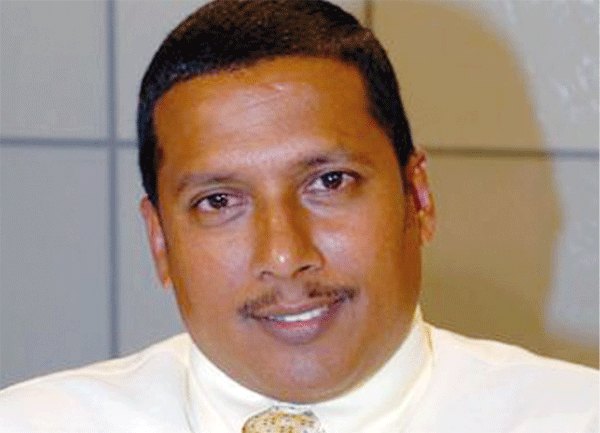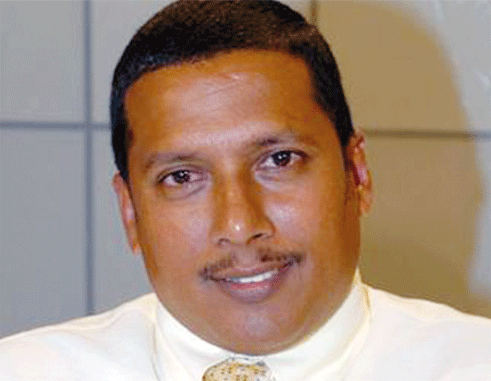Joseph Tells Court In His Boundaries Affidavit

CASTRIES South East parliamentary representative Guy Joseph is calling on the High Court here to find the report of the Boundaries Commission null and void and of no effect, adding that it is “tainted” by undue political influence.
The case, which began last Friday with a decision that it will be heard, centres around an attempt by Joseph to stop the recommendations of the Commission to increase the number of electoral constituencies from 17 to 21 as of the next general elections.
Joseph who launched his challenge of the Boundaries report in his personal capacity has since received the support of his opposition United Workers Party, which has thrown its support behind him.
The date for the hearing of the case has not yet been determined.
Joseph is also calling on the High Court to order a review of the Commission report and quash any decision of the Commission contained in such report.
He is also seeking to restrain Prime Minister Dr. Kenny Anthony, or anyone connected to him, from submitting to the Governor General the draft order approved by the House of Assembly three weeks ago calling on the Governor General to give effect to the recommendations contained in the report.
He is also seeking the same injunction against the Attorney General, Kim St. Rose in her capacity as the legal representative of the Governor General, restraining the Governor General from making any order to enforce the Commission’s recommendations.
Joseph’s case also names the five members of the Boundaries Commission, the Prime Minister and the Attorney General as respondents.
Joseph, in his affidavit, made reference to a report of the Commonwealth Secretariat which was produced on June 12, 1998 for the St Lucia government which spoke of the legal structure of the Commission and which made several recommendations to the government.
He quoted several sections of the report in his affidavit, noting that the Commission had never consciously applied the formulae for review and recommendation, that it failed to use its procedural powers and had not seriously regarded itself as an independent body as required by the 1979 Constitution.
The Commonwealth Secretariat also made several observations in its report in relation to the delimiting of constituency boundaries calling for an explanation as to why the Constitution of the land had been ignored so consistently, and suggesting that the problem may have been because of the intense politicization of the composition of the Commission than with any inherent problem with the legal principles it should obey on the controls on its discretions and procedures.
Joseph quoted in his affidavit the section of the Commonwealth Secretariat Report that states that the long standing politicization of the constituency delimitation in Saint Lucia was exacerbated rather than moderated by the institutional machinery put in place by the 1979 Constitution. And that the provisions did nothing to encourage the objectivity or professionalism of the institution. Instead they exaggerated its manipulative potential and thus its use as a party political instrument rather than a tool of electoral democracy.
He said that to the best of his knowledge most of the recommendations of the Commonwealth Secretariat, aimed at providing the Government of Saint Lucia with tools to engage in constituency boundary reform in accordance with best practices, with a view to encouraging adherence to or compliance with the letter and spirit of the Constitution, have not been implemented.
Joseph added that in is within this highly politicized and partisan context that the Commission has continued to operate and the report was created.
“It is my contention that the interim report was tainted by undue political influence, direction and/or control exerted over the Commission, and a flawed process presided over by its Chairman,” Joseph stated in his affidavit.
He added that the Commission’s Chairman, Peter Foster was instrumental in procuring the proposals of the Saint Lucia Labour Party of which he is a member. These proposals, Joseph stated, formed the basis of the Boundaries Commission Report.
“The Chairman of the Commission wrongly instructed or directed the members of the Commission to liaise directly with the respective political parties with which they were affiliated and obtain proposals for the Chairman’s consideration,” Joseph stated, adding that to the best of his knowledge the Boundaries Commission Report was never presented to the United Workers Party for consultation or feedback, neither was there consultation with any other political parties or stakeholders in the matter of constituency demarcation including those responsible for local government namely, the Constituency Councils of Saint Lucia, nor was there any consultation with the Electoral Commission.
He accused the Commission of not publishing a preliminary report for public comment. “No members of civil society were consulted and that there were no town hall meetings to discuss the report”, the MP is claiming.
“To the best of my knowledge, the Commission did not solicit or review by public inquiry any objections to the report but adopted the partisan proposals of the Saint Lucia Labour Party,” Joseph stated in his affidavit.
Joseph’s grounds for the relief he is seeking in court is contained in part in Section 57 (11) of the Constitution which declares that in the exercise of its function a Commission shall not be subject to the direction or control of any other person or authority. He stated that the Commission is constitutionally bound to act as an impartial and independent body and to carry out its mandate in a bona fide manner in accordance with the provisions of the Constitution without being subjected, or allowing itself to be subjected, to the improper influence, direction or control of any other person or authority.
He added that the process adopted by the Commission in preparing and submitting the Report was “fatally flawed”, in that it contravened the spirit and letter of the Constitution, and in particular section 57(11) and that it was apparent that the Chairman held the erroneous view that the Commission members appointed on the advice of the Prime Minister were meant to act as the agents and representatives of the Saint Lucia Labour Party, and that the members appointed on the advice of the Leader of the Opposition were meant to act as the agents and representatives of the United Workers Party, and that in discharging their respective functions as members of the Commission they were expected to solicit and articulate the positions of their respective parties.
“Consequently, by requesting the Commission members to present the proposals of the parties which they represented, the Chairman contravened the provisions of section 57(11) of the Constitution,” Joseph stated in his affidavit.
He added that the approach adopted by the Chairman was politically divisive, and required the Commission members to act, not as one independent body, but rather in accordance with the dictates, and to represent the views, of the respective political parties with whom they were affiliated.
“This was subversive, and in direct contravention, of the requirement under section 57(11) of the Constitution that the Commission not be subject to the direction or control of any person or authority. By soliciting or procuring from the Saint Lucia Labour Party, and/or privately meeting and collaborating with the Saint Lucia Labour Party in the preparation of, proposals for the increase in the number of constituencies into which Saint Lucia is divided, and for the realignment of their boundaries, the Commission members appointed on the advice of the Prime Minister abdicated their duty to act independently, and improperly allowed them to be directed and controlled by, and thereby became the advocates and agents of, the Saint Lucia Labour Party. This was inconsistent with the mandate of Section 57(11) of the Constitution, which required that the Commission members act as a unified, autonomous and independent body, free from direction or control of any other person or authority,” Joseph stated in his affidavit.
He added that the process adopted by the Chairman of the Commission was also flawed because it was not the function of the Commission members to make or submit proposals to the Chairman. The Commission, as a single body, was required to review the number and boundaries of the constituencies into which Saint Lucia is divided and to submit periodic reports to the Governor-General.
“In discharging this function, the Commission was entitled to formulate preliminary recommendations, solicit professional advice, engage in information gathering, and, as a unified body, consult with and receive recommendations from all stakeholders, including the political parties. At the end of this process, the Commission would then make a final report containing their recommendations, which report would be submitted to the Governor General. The misconceived approach in fact adopted by the Chairman, however, fragmented the Commission, by requiring its members to act independently of each other, in two distinct camps, with the Chairman acting as umpire or referee. The Chairman improperly directed the other members of the Commission to submit their respective proposals to him and by doing so grotesquely distorted the proper role and functions of those members. This was repugnant to the structure, duties and functions of the Commission that was contemplated by sections 57 and 58 of the Constitution,” Joseph stated in his affidavit.












![.[L-R] Parliamentary Representative for Castries Southeast, Lisa Jawahir & Talk show host, Timothy Poleon](https://thevoiceslu.com/wp-content/uploads/2026/02/Lisa-Jawahir-Timothy-Poleon-380x250.jpg)
![Public Service and Utilities Minister Stephenson King delivered remarks [Photo credit: VP]](https://thevoiceslu.com/wp-content/uploads/2026/02/Stephenson-King-380x250.jpg)

